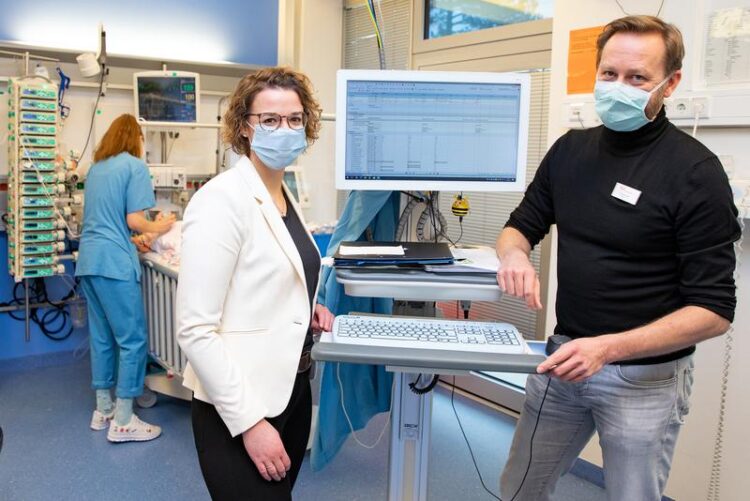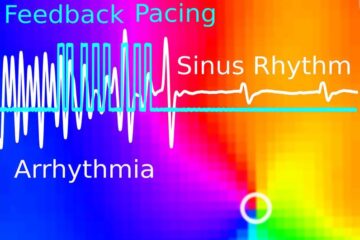Co-pilot at the bedside

Dr Thomas Jack and Dr Antje Wulff next to a PDMS monitor in the paediatric intensive care unit.
Copyright: Karin Kaiser / MHH
Research network develops digital alarm system for paediatric intensive care medicine.
Working in intensive care units poses special challenges for healthcare workers. They have to safely and reliably detect whether the condition of their seriously ill patients is deteriorating in a life-threatening way, and they have to do so under great time pressure because every minute counts. The stress level increases even more when the patients are children and adolescents. In paediatric intensive care, doctors are confronted with the problem that the diseases are sometimes difficult to recognise and – depending on age and gender – also progress differently.
The research project “A Learning and Interoperable Smart Expert System for Paediatric Intensive Care Medicine (ELISE)”, led by Dr Thomas Jack, Senior Physician at the Department of Paediatric Cardiology and Intensive Care Medicine at the Hannover Medical School (MHH), aims to provide support. The aim is to develop concepts for a digital decision support system that brings together vital signs and laboratory values important for treatment directly at the patient’s bedside, analyses them and immediately sounds the alarm if necessary. The joint project with the Peter L. Reichertz Institute for Medical Informatics at the TU Braunschweig and the MHH (PLRI), the Fraunhofer Institute for Toxicology and Experimental Medicine (ITEM), the University of Münster and the software developer Medisite is being funded by the Federal Ministry of Health with more than two million euros over three years.
Developing computer-readable diagnostic models from disease data
Medical informatics is already helping to document patient data. The Patient Data Management System (PDMS) collects recorded vital parameters such as blood pressure, heart rate or body temperature, stores laboratory values, medication administration or diagnoses and makes them available at any time. “However, the PDMS is not able to interpret these values and thus recognise critical situations,” says Dr Jack. This will now be possible with the help of ELISE for the diagnosis of severe organ dysfunction and associated severe circulatory failure – a problem that often occurs after surgery, among others.
“We want to use the routine data and expert knowledge to convert diagnostic models for organ dysfunctions into computer-readable algorithms,” explains Dr Antje Wulff, medical informatician at the PLRI. In the recently completed CADDIE study, this has already been achieved for the detection of Systemic Inflammatory Response Syndrome (SIRS). SIRS shows similar symptoms to sepsis and can cause severe organ dysfunction and, in severe cases, death of the patient.
ELISE is no substitute for medical staff
Now the research team aims to further develop the CADDIE idea. In a first step, ELISE will be fed with the data of 5,000 patients who were treated in the paediatric intensive care unit of the MHH in the past years. “We first look to see whether the system interprets the data correctly, so to speak in retrospect, to make the right diagnosis,” says the senior physician. At the same time, the scientists are looking for recurring patterns in the existing data in order to specifically train the digital support system. In this way, ELISE should learn and eventually itself recognise the criteria for impending organ failure in real time and report it immediately. If the system works and is approved, the way is clear for a live application next to every patient’s bed to support doctors and nurses. “A computer knows no stress and always has time to evaluate data,” says Dr Jack. However, medical decisions are not made by the system, but by the human being, the physician emphasises. “ELISE is just a kind of co-pilot that, as a digital companion, frees doctors and nurses from the constraint of continuous data control and ensures that life-threatening developments can be recognised immediately and thus treated in time.”
SERVICE:
For more information, contact Dr Thomas Jack, jack.thomas@mh-hannover.de, phone (0511) 532-6290.
Information on the CADDIE study (Cross-institutional and data-driven decision-support for intensive care environments) can be found here: https://pubmed.ncbi.nlm.nih.gov/33602206/
Media Contact
All latest news from the category: Medical Engineering
The development of medical equipment, products and technical procedures is characterized by high research and development costs in a variety of fields related to the study of human medicine.
innovations-report provides informative and stimulating reports and articles on topics ranging from imaging processes, cell and tissue techniques, optical techniques, implants, orthopedic aids, clinical and medical office equipment, dialysis systems and x-ray/radiation monitoring devices to endoscopy, ultrasound, surgical techniques, and dental materials.
Newest articles

Wildfire danger to increase due to climate change
WSL Institute for Snow and Avalanche Research (SLF) researchers expect an elevated wildfire danger in the Alpine Foreland from 2040 onwards due to changing meteorological conditions. The danger currently remains…

Advanced Brain Science Without Coding Expertise
Researchers at Helmholtz Munich and the LMU University Hospital Munich introduce DELiVR, offering a new AI-based approach to the complex task of brain cell mapping. The deep learning tool democratizes…

Gentle defibrillation for the heart
Using light pulses as a model for electrical defibrillation, Göttingen scientists developed a method to assess and modulate the heart function. The research team from the Max Planck Institute for…





















